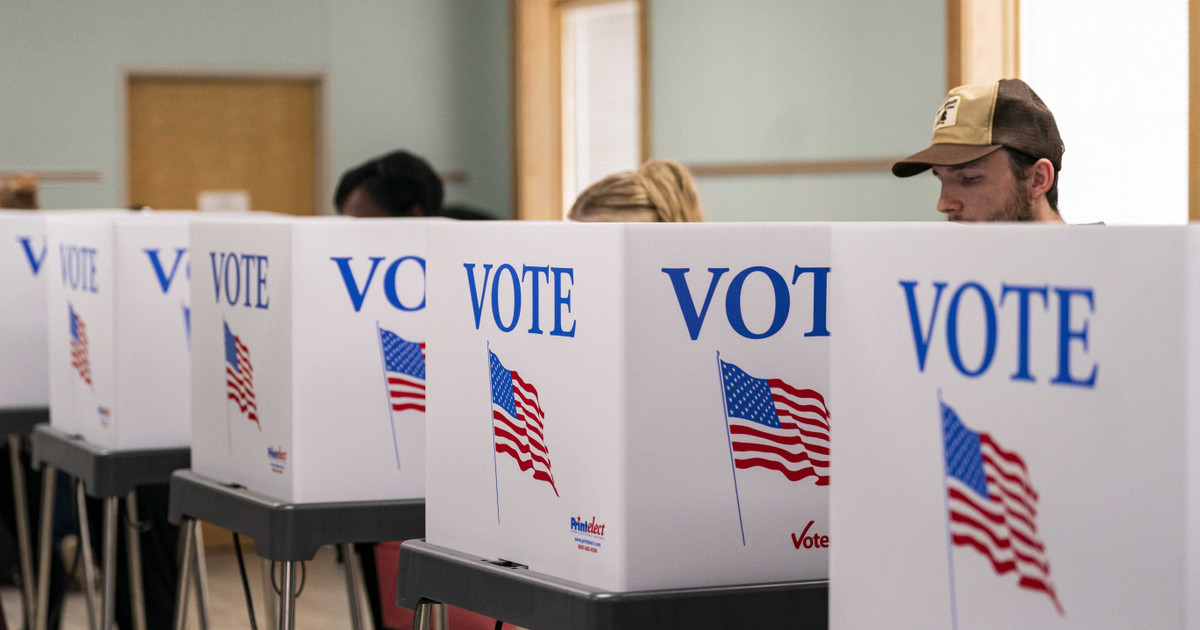ProPublica is a nonprofit newsroom that investigates abuses of power. Sign up for Dispatches, a newsletter that spotlights wrongdoing around the country, to receive our stories in your inbox every week.

I Worked for Joe Biden. I Love Joe Biden. He Must Rethink His Post-Presidency.
May 16, 2025
Are Some Dems About to Cave to Crypto? It Wouldn’t Be the First Time
May 16, 2025Last week, North Carolina Democrats scored a victory when Republican Judge Jefferson Griffin, who’d lost a tight race for the state’s Supreme Court, finally conceded defeat after a six-month legal battle to throw out ballots that he contended were illegitimate.
But that same morning, the party suffered a setback that may be more consequential: losing control of the state board that sets voting rules and adjudicates election disputes.
The board oversees virtually every aspect of state elections, large and small, from setting rules dictating what makes ballots valid or invalid to monitoring compliance with campaign finance laws. In the Supreme Court race, it consistently worked to block Griffin’s challenges.
The conservative takeover comes after the Republican-controlled state legislature passed a law stripping the power to appoint board members from North Carolina’s Democratic governor and gave it to the Republican state auditor.
Although a board spokesperson said its chair was traveling and unavailable to answer questions about how the new Republican majority would reshape North Carolina elections, experts said it will likely make it easier for challenges like Griffin’s to succeed and reduce expansive access to early voting.
It will “tilt the playing field to the advantage of the GOP,” said Gene Nichol, a law professor at the University of North Carolina at Chapel Hill who studies democracy in the state.
The party that controls the board holds significant power over who votes, how those votes are counted and who ultimately wins races.
Ann Webb, the policy director for Common Cause North Carolina, a liberal voting advocacy organization, called the shift “very consequential” and said she was worried the new board would seek to remove voters whose registrations have missing information from the state’s rolls and tighten requirements for people seeking to register or have provisional ballots count.
Conservatives called Democrats’ concerns overblown, particularly after years of Democratic control. Mitch Kokai, a senior political analyst at the John Locke Foundation, a conservative North Carolina think tank, conceded the board’s new majority might alter early voting locations or voter ID rules, over which the parties are divided. But he pointed out that many board decisions are made unanimously, not split along party lines.
“There is some sense that in the age of Trump there is some grand scheme to throw out election results and let the GOP win despite how people voted,” Kokai said. “I don’t think you’re seeing the stage being set for anything like that.”
Historically, the board’s five members have been appointed by North Carolina’s governor, with three of them coming from the governor’s party. Since 2016, the governor has been a Democrat.
When Josh Stein won a four-year term last fall, a Republican supermajority in the state legislature passed a law, then overrode his predecessor’s veto, to transfer this power to the state auditor. It was an unusual step. No other state has elections overseen by the state auditor.
Stein sued to block the law and, initially, a lower court sided with him. But in April, the state’s Court of Appeals, which has a Republican majority, issued a three-sentence decision overturning the lower court’s ruling without hearing oral arguments.
The next day, the state auditor named two new Republican members to the elections board, flipping control of it to conservatives. One is a former legislator who led efforts to redraw the state’s congressional districts in conservatives’ favor. The other was the longtime head of a conservative think tank with a history of advancing unsubstantiated voter fraud claims.
After swearing in the new members last week, the board’s first move was to fire its executive director, Karen Brinson Bell, replacing her with the general counsel to the speaker of the North Carolina House, a Republican. The board denied Bell’s request to address her staff during the meeting, but she subsequently released a statement that a spokesperson provided to ProPublica in response to a request for comment.
“We have done this work under incredibly difficult circumstances and in a toxic political environment that has targeted election professionals with harassment and threats,” she said of the board’s employees. “I hope we return to a time when those who lose elections concede defeat rather than trying to tear down the entire election system and erode voter confidence.”
Experts say the just-concluded battle over the Supreme Court seat provides a window into how changes at the elections board could affect future races, especially close ones with contested results. North Carolina is a swing state, and there have been several such cases in recent years. After the 2018 election, the board ordered a new election for a U.S. House of Representatives seat when a Republican victory was found to be tainted by an illegal absentee ballot scheme.
Before the 2024 election, right-wing activists discussed ways to overturn close election losses using a plan similar to the one Griffin put into action, according to a recording of a call obtained by ProPublica.
In the month after suffering a 734-vote loss to incumbent Democrat Allison Riggs, Griffin asked the elections board to toss out tens of thousands of ballots, mostly because information about the voters who cast them was missing from the state’s election database. The board, then majority Democrat, dismissed his challenges, concluding that voters had followed the rules in place at the time and that much of the missing information reflected administrative or clerical errors. Then Griffin sued.
Gerry Cohen, a former counsel for the legislature who is now a Democratic member of the Wake County Board of Elections, said it was “a real possibility” that a Republican-controlled state board “would have approved some of Griffin’s challenges” to throw out ballots. If that had happened, Riggs could have fought the board’s decision in the courts and won, but she would have then been litigating against the board rather than on the same side as it.
The law that gave the state auditor the power to appoint members of the state election board also gives him similar authority over North Carolina’s county election boards, which will mean each of them will be controlled by Republican majorities by the end of next month.
County boards approve locations and times for early voting, which is when the vast majority of North Carolinians vote. Experts predicted this could lead some boards to reduce the number of polling sites in areas that have more Democrats, like college campuses, or to close polls when Democratic voters are more likely to use them, such as Sundays when Black churches conduct “souls to the polls” voter drives.
Kokai contends that such changes aren’t necessarily meant to suppress the vote, if they even happen, and doubts they’d have much of an effect on Democratic turnout.
“If you really do care about voting, you do it,” he said. “If you go a mile off campus to do other things, you can do it to vote, too.”
Liberals, however, expect the revamped board to work hand-in-hand with the Republican-controlled legislature to transform elections in other ways.
“Things are going to look very different,” Webb said, in the 2026 midterm elections.
Great Job by Doug Bock Clark & the Team @ ProPublica Source link for sharing this story.





